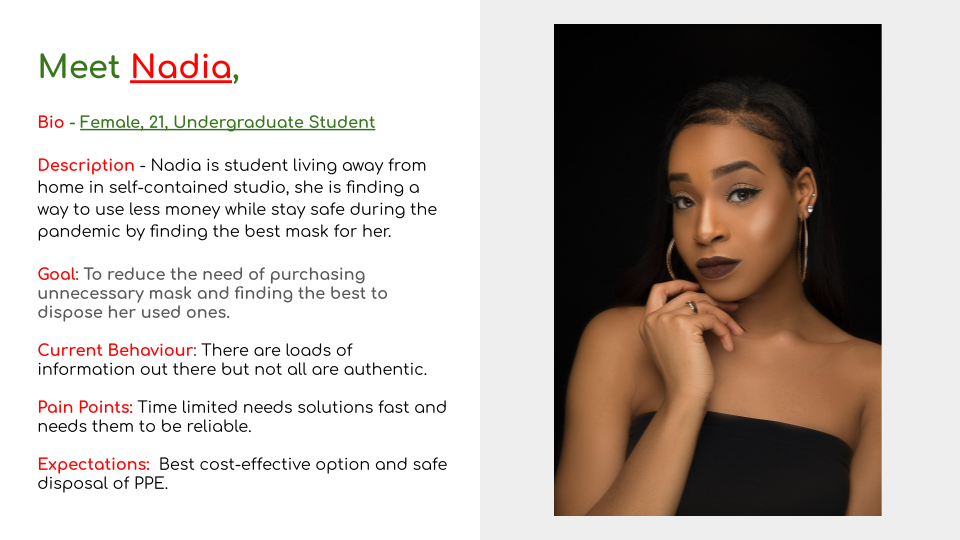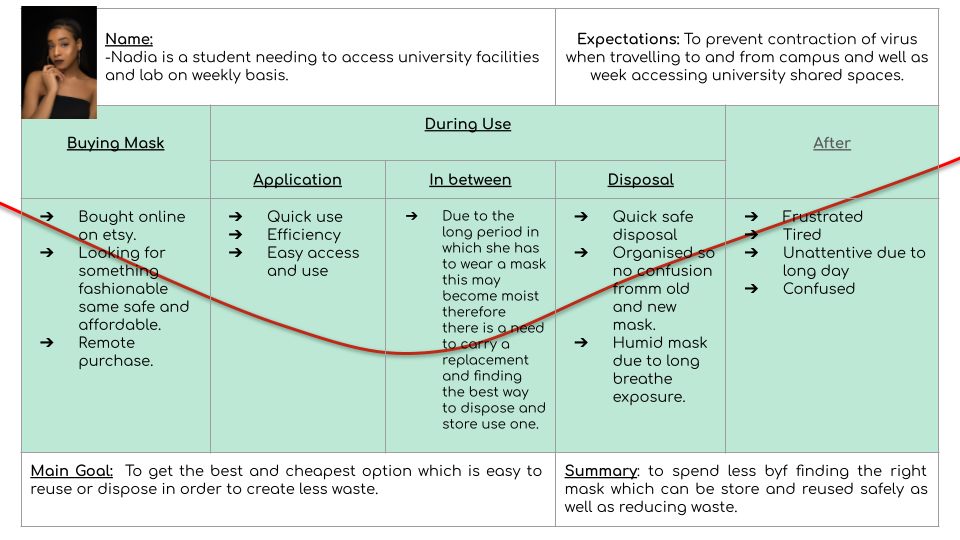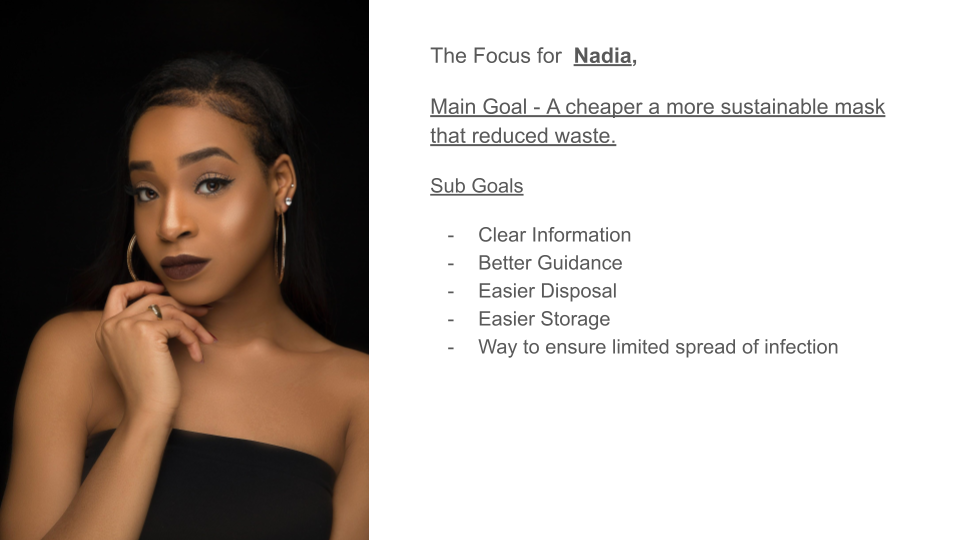
Student Service Design Challenge 2021
Help me 2 Bin PPE
The Problem
The world's population consistently increases consequently the volume of waste keeps rising, especially since the COVID- 19 pandemic. Executing a strategic reverse logistics strategy is a key component in reducing this worldwide waste issue. Implementing a local, accessible and user-friendly service design in Bristol is necessary to curve the likelihood of a plastic pandemic and pave the way for a sustainable future.

Our Solution
Our service aids the recycling of PPE in the most conveniently flexible way possible for the user. Starting with the HM2BP (HELP ME 2 BIN PPE) keychain which safely houses, transports and disposes of masks easily while on the go. The keyring then assists safe disposal from the comfort of their own homes into the designated HM2BP collection bin; this bin comes with an amalgamated mask pickup service/ schedule. With the HM2BP Service, you can correctly handle PPE without compromising a person's daily behavioural traits while allowing the user to feel comforted knowing their minor changes will have a lasting impact on the environment. With HELP ME 2 BIN PPE, you can save time, money, effort, and consciousness (by succeeding in the eradication of PPE landfill waste and creating a successful circular system by collecting, recycling and repurposing PPE).
Inital Research.
During our initial Research stage, we decided to fully deep dive into the secondary research surrounding PPE and Recycling. We decided to keep it in a local context to allow Bristol to become a case study for how a service like this could work. We researched the contextual surroundings of the rise in PPE and the likelihood of continued PPE usage after the pandemic. We found strong evidence that much like the SARS epidemic in South East Asia, it would likely become more commonplace for masks to be worn while ill.
Bristol’s Current Recycling System.
The city of Bristol has already put into motion a variety of different plans to close the loop on existing linear business models. Bristol focuses heavily on an issue that is still plaguing the UK: single-use products. In 2016, a report was released titled “Towards a Zero Waste Bristol: Waste and Resource Management Strategy”. In this report, it states that one key target is to "Recycle and prepare for reuse (including composting) 50% by 2020". Although this expected 2020 target was not reached according to the 2020 Key Facts.Gov report. Only "46.8% of all household waste was sent for reuse.”
Bristol’s Willingness to incorporate more recycling efforts and proactive approach to waste management made it an ideal place for our project to be tested, as well as the most receptive to new recycling methods as Bristol has added a variety of new recycling endeavours to the city over the last 10 years, like the Avonmouth processing plant, which processes household food waste into biomethane
We Chose to focus on Masks
"Approximately 89 million medical masks were needed to respond to Covid-19 each month" according to The World Health Organization (WHO). A total of 54,010,275 different face mask varieties were delivered to the UK in the seven days following the 17th January 2021. This inclined demand for PPEleads simultaneously to an increase in waste. The Guardian suggests "53" Million being thrown away each day. That means the UK alone produces (and eventually discards)estimated 356 metric tones of face masks each week, according to predictions made by BristolPost in calculation with Greenpeace's study on Taiwan. "Single-use polymeric materials have been identified as a significant source of plastics and plastic particle pollution in the environment" with a lifespan of 450 years, these masks are an ecological time bomb".
User Research.
For our user research, we conducted interviews, surveys and observations to create a variety of helpful tools to better understand our target population. We analysed the data to find key themes and quotes to further our understanding of the problem surrounding PPE and why people don’t dispose of it properly. This resulted in us finding 3 main conclusions for how we were to design our solution.
Effort
Accessibility
Safety
EcoMapping
The researchers of this study decided on the following steps to take, which gained a better understanding of the user flow and journey they take when utilizing PPE (mask). To do this, it began by addressing and grouping the most relevant target groups, these group would reflect the biggest mask users and other PPE waste producers. This research has segmented the users into four groups - leisure, healthcare, residential, education, this is to help to analyze details of each category and how each one of these categories can then be further segmented into the fundamental areas of user, community, service and institutions. Each of the four researchers took the responsibility of exploring a group while making use of ecosystem map methodology, which allowed to gather a better understanding of how users within this group would make use and dispose of masks (PPE) and how each stakeholder relates to one another. Helping to understand which other tangible factors of this service would be involved in this journey, for example, bin accessibility.
Personas
To create empathetical theme-driven insights stories user personas that stereotyped our demographics were created. These demographical representatives focused on characters; bio's, description's, goal's, current behaviour's, pain point's and expectations throughout numerous differing PPE encounters. We used Mural to develop a digital post-it board that was colour connected. These post-its were derived from theoretical personas which we created from analyzing our interview findings. Using this method allowed us to clearly map and arrange the information so we could create more comprehensive personas.












Frame and Redefine.
After all of the data analysis, we reviewed all of it to make sure it was relevant to our problems statement. The group polished each of the categories found in the eco mapping and displayed it on a visual map. In this, it is possible to perceive arrows that connect correlations of needs from the other areas. The ultimate goal of this project is to create and/or develop a product or service which will assist us in tackling the unnecessary disposal of single-use plastic if not able to stop its use. So we furthered the needs statements to better understand each aspect and it’s connection to our goals




Brainstorming
The team created a map of ideas that may not be possible, later continuing to eradicate the impossible conceptions. This image represents the diagram of the ideas which were realistic and could be later implemented to a design ideation service or product.
As a group, we wrote all the ideas we could in no particular order. Then, we connected similar ideas and concepts to figure out the underlying logic.
Concept Selection
Utilising the framework of concept selection we divided our concepts into 3 definite stages; User perspectives, Service Provider Perspective and Revenue Perspective. We used each stage to test the validity of each idea in conjunction with its value, effort or cost.
Once understanding the logistical practicalities we then understood that we would have two revenues of service. One is Reduce, Reuse which acts as a promotional campaign with the tangible element being a keyring mask storage/disposal unit. The other is the Recycling element which acts more as a consultancy service to the already implemented Bristol Waste companies food waste campaign Slim My Waste - Feed My Face which tangible feature would be a home PPE disposal bin.
New User Journey Map
As a result of this thought process, it was possible to come up with a user journey timeline, which was applied to a previously created user persona. We saw how these smaller services could be connected to intervene seamlessly into the user’s life. We can see the possible issues which may arise depending on the situation and given alternatives that could be created to solve these in that instant.
Our Service
Our Service utilises a dual pathway to ensure seamless integration into user lives
REDUCE
The Reduce Pathway is a more personal and user-focused methodology, utilising advertising and consumer awareness to reduce the number of people buying disposable masks which in turn reduces the amount littered. This method focuses on the use of a keychain to help the user to remember their reusable mask and store their disposable mask should they have to use one.
Promotional Method
This method involves us interacting with shops to encourage the promotion of reusable masks and storage keychains and limit the sale of disposable masks as a means to further persuade users to buy reusable masks. Since some of our users liked the idea of aesthetics the service model could originally give our free, bland, keyring vessels but could eventually with the recycled plastic of the recycle pathway create more sustainable and fashionable keychains. This will, also, allow for the reuse of portable ashtrays which have a similar construction.
RECYCLE
The Recycle Pathway is a more systematic and strategic method to collect and recycle PPE waste. Working alongside Bristol Waste Company, we will consult on the construction of the service and develop the promotional materials to urge Bristol residents to collect their disposable masks in a small box to be collected Bi-weekly alongside their waste.
Collection Method
For smaller households and apartments, there is a drop-off option as it is unlikely to be that many masks collected in a 2 week period. For business, there will be a larger collection vessel as well as provided litter pickers so they do not have to contact potentially infected masks by hand. This will likely yield the largest number of masks. Once collected the masks will be sent to a third-party company to be processed and recycled. We recommend either the WaterHaul, which is closer and cheaper meaning that it would save money for the company to transport and create fewer emissions to transport. Another we would recommend is TerraCycle as it is more reputable and has been recycling PPE waste for a longer period and thus us more experienced

IN CONCLUSION
In conclusion, even as Bristol comes out of lockdown many still are likely to wear masks in the future meaning that our service can cater to a new kind of waste that will only grow or plateau in future societies. We can work alongside our city to prepare for our PPE future and trial a system that can be applied to many other cities or potentially countries. Our service encourages more sustainable and circular living by reducing the purchase of disposable PPE and developing a means for dealing with it when it does arise.
We developed HM2BP (Help me 2 Bin PPE) as a service to be empathetic to users’ current behaviour in order to realistically handle PPE Waste. Taking into consideration of our conclusion categories; effort, safety and accessibility. The user can eradicate potential forgetfulness through the keychain implementation, saving money and time. While having a reliable disposal system that is relatable to their already existing waste routine. Our recycle pathway gaining revenue through the constancy of Bristols waste company as well as the potential to create a profitable trend of keyring disposal infrastructures. Overall, we are very proud of our project and confident in our effectiveness at handling PPE waste.














